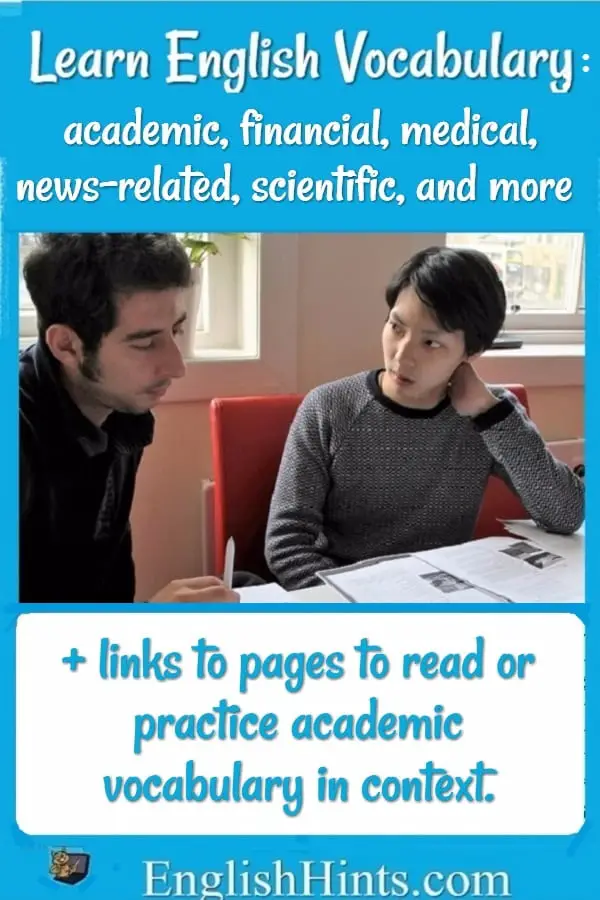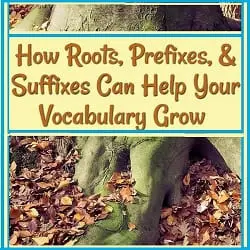You Can Learn English Vocabulary
It's a challenge to learn English vocabulary. English has a huge number of words, many with several meanings. It has many synonyms— words with similar meanings.
There are also lots of homonyms-- different words with the same pronunciation. (Sometimes they have the same spelling, too!)
They make English harder to learn, but also richer and more expressive. Think of it as a game-- one you can win!
The Roots of English in Many Languages
There are historical reasons for the richness (and difficulty) of English.
English has Germanic roots. Roman, Danish, and French invasions expanded English vocabulary. They also provided many cognates.
Cognates are English words that are like words in other languages because they come from the same roots.
If you speak a language related to German or Latin, you'll find lots of cognates in English. Recognizing the way they work can boost your English reading comprehension and vocabulary.
Be careful with cognates, though. A few words seem related but are “false cognates.” Ask yourself, "does the related meaning make sense?"
As English explorers and colonists came into contact with other languages, they often borrowed words. Now increased world communication and trade are helping English grow faster than ever. (See English Word Origins.)
Study Roots & Affixes
The best way to learn English vocabulary outside of a classroom is to read as much as possible. We need to see or hear a new word repeatedly to learn it well. As you read a word again and again in different contexts, you also learn various ways to use it.
Another way to recognize more words is to study their parts: their roots and affixes. (Affixes are prefixes-- word beginnings, and suffixes-- endings.) Learning roots and affixes is so useful that EnglishHints devotes a whole section to it. See Roots, Prefixes, and Suffixes.
Knowing them is especially important for university studies. They're also valuable for professional or business dealings in English.
Learn Professional or Academic Vocabulary

Students and professionals also need some specialized vocabulary. Business Vocabulary & Teamwork and Cooperation Vocabulary both explain and offer practice on words important for business. Master Business English suggests other websites with language important for business.
Characteristics of Good Leadership and How to Change Someone's Mind discuss skills and demonstrate vocabulary important for business people and professionals. (How to Change Someone's Mind also offers a free workbook with phrases and vocabulary important for persuasion and workplace problem-solving.)
Medical English is useful for health professionals. (Basic Medical Vocabulary gives words patients and their families need too.) Budding scientists might study The Language of Research and Scientific Method Vocabulary. Both explain key scientific terms (from double-blind experiments and bias to data analysis and conclusions) and demonstrate them while explaining research procedures.
University students and professionals might want to study the Academic Word List (AWL). You'll know many of these words, but it's handy to have them combined into one list. See Academic Vocabulary for more details.
Academic Vocabulary Lessons discusses a course to help you learn academic English in minutes a day. Get personalized, step-by-step help with the vocabulary you need for university study. It can help you to score well on the TOEFL or IELTS tests.
Several pages in English Hints teach specific categories of words from the AWL including
- Linking Words, and
- Political Language.(with considerable non-AWL vocabulary as well.)
Understanding the News in English and News Vocabulary discuss news terminology and practices.
So do the related pages Vocabulary for Violence, War Vocabulary, and Words for Truth, Falsehood, and Error. Some also include practice exercises.
Biblical English talks about the English used in the King James Bible. (It's from 1611, in Shakespeare's time.) The page explains how it differs from current English. It discusses thee, thou, and thy (2nd person singular forms we no longer use.) It also explains canst, didst, and other verb endings we don't use anymore, and some words now used rarely.
Other (AWL+ vocabulary) pages with both explanation and practice include:
(See also Vocabulary Games and Activities. It has matching, gap-fill, and other practice exercises for most of the words on the AWL.)
Study the Academic Word List Systematically
Use the Academic Vocabulary Word Lists 1, 2 (for newsletters 6-10), 3 (issues 11-17) or 4 (issues 18-23) if you want to study the entire AWL in systematically. They list the readings and practice activities in each newsletter through #23. Those newsletters let you practice the entire Academic Word List. They link to related reading selections, talks, exercises, crosswords, and quizzes.
3 Ways to Learn the Academic Word List has more book & website suggestions+.
You can sign up for English Detective below. Each issue discusses or reviews useful words found in that issue's readings or talks.
To practice particular words in the AWL, you can check the Academic Word List Vocabulary pages. They're alphabetical lists of the whole AWL. They show the different forms of each word (access, accessible, etc.) and the newsletter(s) that practice it. See Academic Word List Vocabulary A-B, C-E, F-M, N-R, or S-Z depending on the words you want to study.
Also, consider spending 3-5 minutes a day learning a new word with the New York Times' Learning Network's Word a Day. (See Vocabulary Strategies for more details.)
Subscribe to English Detective for a systematic way to learn academic English vocabulary. Fill out the sign-up form (right column or page bottom.) Every month you'll get several fascinating reading or listening selections and vocabulary practice.

Building Vocabulary Week by Week gives details about English Detective. (It also describes the free ebook for people who subscribe to it.)
See Vocabulary Strategies for effective study ideas.
Changing a Word's Part of Speech or Meaning
In many ways, English vocabulary is very flexible. You can create a new word by changing the word ending. (Word endings show the word's part of speech: whether a word is a noun, verb, or adjective, for example.) See List of Suffixes, Word Families, Word Family Practice, and Word Formation Examples and Exercises.)
Sometimes the same word may be used as a verb OR a noun or another part of speech. A few examples of words that can be verbs or nouns are approach, factor, focus, grant, review, or support.
Contract, contrast, desert, object, & present are examples where the noun and verb are spelled the same, but pronounced with the stress on different syllables. The nouns are stressed on the first syllable; the verbs on the second. (This is the usual pattern for stress in two syllable words, but there are MANY exceptions.)
A verb's past participle (like broken, hidden, or required) may be used as an adjective. A verb's present participle may also serve as a noun called a gerund. (Example: "Riding a bike is good exercise. So is jogging.") You can tell which part of speech a word is by its location in a sentence.
Sentence structure is the main way we recognize the part a word is playing. (That is a major reason why English word order is less flexible than many languages.)
We can also take what was a noun and make it a verb (or make a verb into a noun) by changing its position in the sentence. The word ‘text’ has been used for centuries as a noun meaning the words of a document. Recently, people have begun to use it as an adjective (“I’ll send a text message”) or as a verb (“I’ll text you.”)
Words that began as names of objects often become metaphors for ideas as well. Eventually they may have a second or third meaning that is completely abstract. This ancient process (common to many languages), also adds to the richness and confusion of English vocabulary.
We talk about the 'fruits' (meaning results) of labor. We might say a discussion is ‘heated’ (meaning angry) or that a person is
‘cold’ (meaning indifferent to the feelings of others.) Those are all metaphors. They use words for physical objects (like fruit) or sensations (like heat or cold) to explain ideas.
Where to go next? A good place to start is Word Families-- seeing how word parts join together to make words.
Didn't find what you
needed? Explain what you want in the search box below.
(For example, cognates, past tense practice, or 'get along with.') Click to see the related pages on EnglishHints.
| site search by freefind | advanced |







